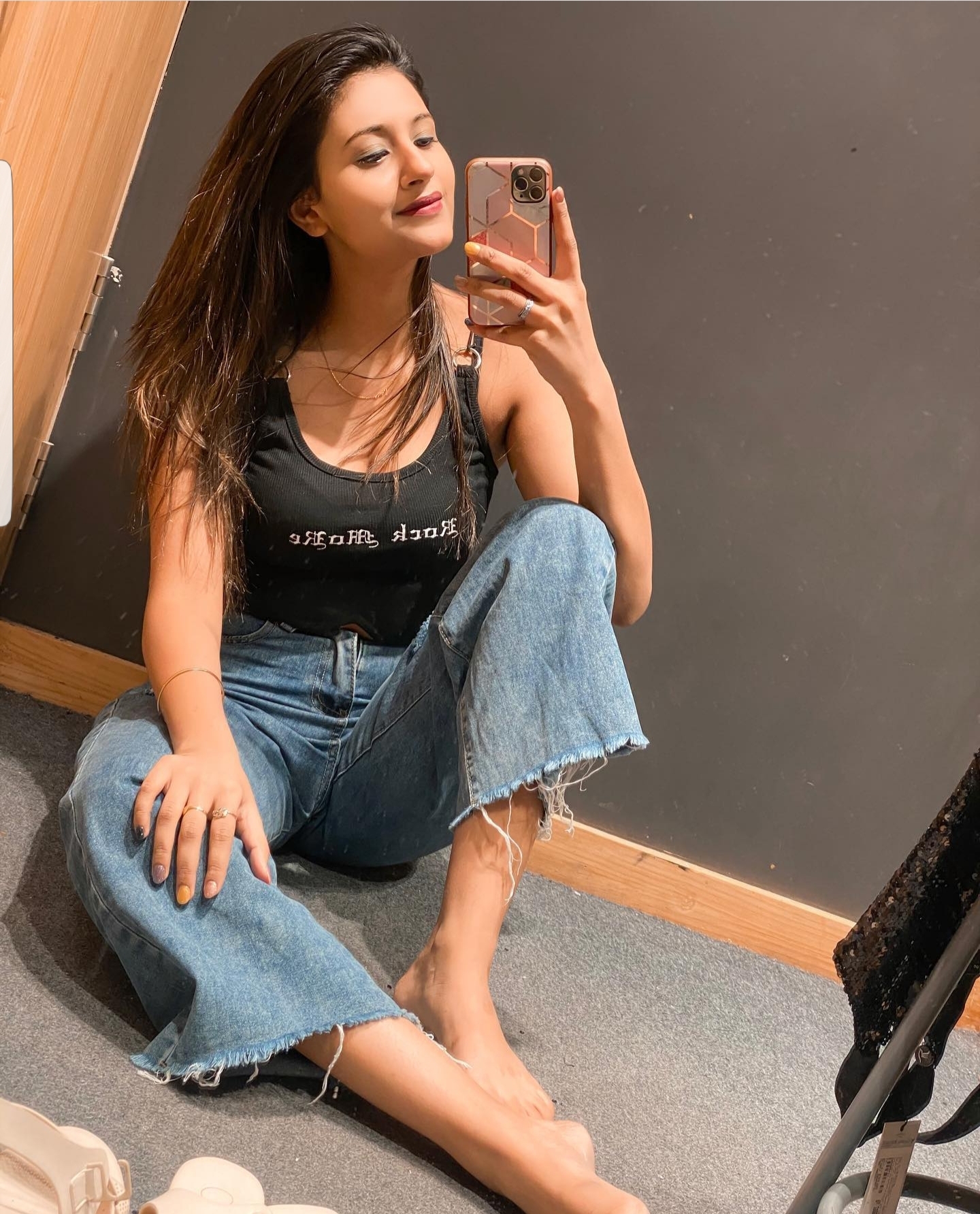Anjali Arora Viral MMS: The Truth, Impact, And What's Next
Have you ever wondered how a name can become a trending topic overnight? The story of Anjali Arora and the whirlwind surrounding her alleged "viral MMS" is a stark reminder of the internet's immense power and its potential for both good and ill. This isn't simply about salacious gossip or fleeting online fame; it's a complex issue touching upon privacy, misinformation, and the ethical responsibilities we all bear in the digital age.
The digital sphere has been buzzing with searches for "Anjali Arora viral MMS," revealing a deep-seated curiosity within the online community. This curiosity, while perhaps understandable given the hyper-connected world we inhabit, underscores a crucial need for responsible information consumption. What is fact, and what is fabrication? Untangling that thread is more vital now than ever.
| Attribute | Details |
|---|---|
| Full Name | Anjali Arora |
| Age | 23 years old (as of late 2024) |
| Profession | Content Creator, Social Media Influencer, Actress |
| Hometown | New Delhi, India |
| Education | Bachelor's Degree in Mass Communication (Likely) |
| Notable Achievements | Finalist in a National Talent Competition, Participation in Reality Shows (e.g., Lock Upp) |
| Known For | Dance videos, lip-sync content, association with reality television. |
| @anjaliaroraofficial | |
| YouTube | [Insert Anjali Arora's YouTube Channel if Available] |
| Background | Anjali Arora gained significant visibility through platforms like TikTok and Instagram, known for creating dance videos and lip-sync content. Her participation in the reality show "Lock Upp" further amplified her public profile. |
| Controversies | Anjali Arora has faced controversies related to alleged leaked videos. It is crucial to approach such content with extreme caution, as claims can often be unfounded and may infringe upon personal privacy. |
| Career Highlights | Notable achievements include gaining millions of followers on social media platforms and appearing in music videos. Her career trajectory reflects the opportunities available in the digital entertainment landscape, where creators can build substantial influence and visibility through online platforms. |
At the heart of this narrative is Anjali Arora, a name synonymous with the dizzying world of social media stardom. But who is the individual behind the viral headlines? Anjali is not merely a figure caught in the crosshairs of internet speculation. She is a young woman navigating the complexities of a career built on digital platforms, facing the unique challenges and pressures that come with such a life. Understanding her background and career trajectory provides crucial context to the events that have catapulted her into the news.
- Unlock Entertainment Hdhub4u 18 Your Adult Content Hub
- Who Is Sabrina Carpenters Dad Discover David Carpenters Story
Viral phenomena are rarely spontaneous accidents. They are the product of a confluence of factors, a perfect alignment of timing, platform dynamics, and audience resonance. In the case of the alleged "Anjali Arora viral MMS," the content's virality stemmed not just from its nature but from the moment it surfaced, the channels through which it spread, and the collective response it elicited. The algorithms of social media platforms, designed to amplify engagement, played a significant role in accelerating its reach, as did the inherent human tendency toward curiosity and the spread of sensational news.
It's vital to recognize that not all viral content is benign. While some trends are harmless and entertaining, others can have devastating consequences for the individuals involved. The dark side of virality includes the potential for cyberbullying, online harassment, and the invasion of privacy. Understanding the spectrum of impact from fleeting amusement to lasting damage is essential in cultivating responsible online behavior.
The core issue revolves around the alleged "viral MMS" linked to Anjali Arora. The term MMS, short for Multimedia Messaging Service, refers to the transmission of content such as images and videos via mobile networks. While the precise details surrounding this alleged MMS remain murky, its alleged existence has triggered a firestorm of online speculation and commentary.
- Kirsten Barlow The Untold Story Of A British Tv Icon
- Review Black Bull Extreme Dont Quit Does It Really Work
Critical thinking is our first line of defense against misinformation. In an era where fabricated narratives can spread like wildfire, it is imperative to critically evaluate the information we encounter online. Do the sources appear reputable? Is there evidence to support the claims being made? Maintaining a healthy dose of skepticism can help to prevent the perpetuation of false or misleading content.
A cornerstone of responsible online behavior is recognizing the potential impact of our actions on others. Sharing unverified information or engaging in online harassment can have profound consequences for the individuals targeted. Cultivating empathy and considering the human cost of our online activity can help to create a more compassionate and ethical digital environment. The proliferation of fake content is aided by the fact that often people are quick to pass things along without regard. It is easier than ever to create a fake screenshots and fake articles. This is also a legal area to be concerned with. If you post or create anything that is intended to hurt someone's name then you could be sued for your actions.
Viral content, particularly content of a sensitive or controversial nature, can have a profound impact on an individual's life. In Anjali Arora's case, the alleged "viral MMS" has likely brought a significant amount of unwanted attention and scrutiny. Such attention can lead to emotional distress, reputational damage, and even physical safety concerns. Understanding these potential consequences is crucial in fostering a culture of online responsibility.
Fame, fortune, harassment, and cyberbullying: these are just a few of the potential outcomes associated with viral content. While the opportunity for increased visibility and financial gain may be tempting, it is essential to weigh these benefits against the potential risks. Creating a sustainable and ethical online presence requires a mindful approach that prioritizes privacy, respect, and responsible engagement.
Respecting privacy is paramount in the digital age. Just because content is accessible online does not mean it is public domain. Individuals have a right to control their personal information and how it is shared. Sharing private content without consent is a violation of trust and can have significant legal and ethical ramifications. It is also important to check privacy settings across various accounts to make sure that others can't easily see personal pictures or information. Social media has made people too comfortable with sharing every detail of their day. The truth is that it is ok to keep things private. It is important to share important moments with friends and family, but a detailed play by play can be risky.
Before sharing any content online, it is crucial to consider its potential impact. Will it contribute to a constructive dialogue, or will it perpetuate harm or misinformation? Taking a moment to pause and reflect before hitting "share" can help to promote more responsible online behavior. Will the content hurt a group of people or single person? Does it take information out of context? Make sure that the information being shared is truthful. It is a moral responsibility to make sure that misinformation isn't spread. All too often content is created with the intention to elicit an emotional response. The creator is trying to shock the person, anger the person, or sadden the person. These are all traps and they are meant to cause the content to be spread rapidly. The truth is that often these types of articles aren't very truthful. It is important to not fall for the trap.
If you witness online harassment or cyberbullying, do not remain silent. Report the misconduct to the appropriate authorities or platform administrators. By speaking out against harmful behavior, you can contribute to a safer and more respectful online community. All too often bystanders of bullying will simply watch and not participate. This gives the person performing the act more power. It is important to take that power away by speaking out against the actions. Often other bystanders will also speak out if just one person does. It is difficult to be the first one to take action, but it is often the most impactful. If more people are willing to stand up, then bullying rates can be greatly reduced.
Social media platforms wield immense influence over the flow of information and the dynamics of online interaction. They have the power to amplify voices, connect communities, and facilitate social change. However, they also bear a responsibility to protect users from harm and to combat the spread of misinformation. Understanding the role of social media platforms is essential in navigating the complexities of the digital landscape. Most of the social media companies were founded with good intentions, but as they have gotten bigger, they have been used in ways that were never intended. There are many stories of governments using social media to spread misinformation and discord. It is important for these companies to invest in resources that combat these abuses. It will help keep the platforms safe and fun for all.
Content moderation is a critical function of social media platforms. By investing in better tools and teams, platforms can identify and remove harmful or misleading content, thereby promoting a safer and more informed online environment. It can be a challenge to ensure that content is fair and isn't politically motivated. It is important that the people making the moderation decisions come from diverse backgrounds. They need to be able to represent different groups of people to ensure fair and equitable results.
Providing users with greater control over their online experience is essential in fostering a sense of safety and agency. Many platforms now offer customizable privacy settings, allowing users to determine who can view their content and interact with them. Education is also key to helping users understand how to leverage these controls effectively. A lot of the privacy settings aren't user friendly and can be confusing to use. Social media platforms need to invest in making the tools easier to use. The easier they are to use, the more likely that a user will adjust the settings to their liking. All too often users don't even change the default privacy settings. A lot of times those settings are more open than they should be. It is a dark pattern to get a user to give up their privacy.
Social media platforms are increasingly investing in educational initiatives aimed at promoting online safety and responsible digital citizenship. By providing users with resources and guidance on how to navigate the online world safely, platforms can empower individuals to make informed decisions and protect themselves from harm. This will help people stay safe and secure while enjoying all the benefits of social media. Education is the first step. It is important that people know how to protect themselves.
The legal ramifications of viral content can be significant, particularly when it involves personal information or private content. In Anjali Arora's case, the alleged "viral MMS" could potentially trigger legal consequences for those involved in its creation and dissemination. Understanding these legal considerations is essential in fostering a culture of online responsibility and ethical behavior.
In today's connected world privacy laws are very important. They protect people's data and determine how it can be shared. These laws vary from country to country. If a company is found to be in violation of these laws then it could face fines and legal charges. It is important for companies to hire people who understand these laws. These people will ensure that data is being used legally. This is especially important for social media companies.
Spreading false information can lead to defamation claims, which can have serious legal and financial consequences. Before sharing any content online, it is crucial to verify its accuracy and to consider the potential impact of your actions on others. The burden of truth is on the person who is sharing the information. It is not the responsibly of other people to verify if the information is truthful. If a person can't verify if the information is truthful then the information shouldn't be shared.
Sharing someone else's content without permission can lead to copyright infringement claims, particularly if the content is protected by copyright law. Always respect the intellectual property rights of others and seek permission before sharing their work. Just because a photo or video is posted on social media doesn't mean it is free to be used. It is still the content creator's intellectual property. If you use it then you could be sued. If you want to use it then you need to ask for permission from the creator.
The future of viral content is likely to be shaped by emerging technologies, evolving social norms, and increasing awareness of the potential impacts of online activity. As we move forward, it is essential to cultivate a more responsible and ethical approach to content creation and consumption. Things will continue to evolve as new technology emerges. It is important to stay ahead of the curve. As technology changes so do the risks and rewards.
Staying informed about the latest trends and developments in digital media and technology is crucial for navigating the ever-changing online landscape. By staying up-to-date on the latest tools, techniques, and ethical considerations, you can become a more responsible and effective content creator and consumer. Look to respected sources for information. Don't get your news from social media. People's lively hood depends on truthful information.
Think critically about the potential impact of what you share and how it might affect others. Consider the ethical implications of your actions and strive to promote positive and constructive engagement online. Will this information cause harm? Make sure to ask yourself that before posting. Not everything needs to be shared. It is ok to keep things private.
Supporting content that promotes positivity, education, and understanding can help to create a more constructive and inclusive online environment. By amplifying voices that promote empathy, compassion, and responsible digital citizenship, we can collectively shape the future of viral content for the better. The things that get the most attention aren't always the best. It is important to shine a light on the good things. This will help make the world a better place.
- Unveiling The Truth The Garth Brooks Conspiracy Theory Amp More
- Unlocking Hannah Kae Fanfix What Is It Why Fans Love It

Anjali Arora's Feet I piedi di Anjali Arora Celebrities Feet 2023

Anjali Arora's Feet I piedi di Anjali Arora Celebrities Feet 2023

Anjali Arora Mms Viral Video Shocking Details Revealed